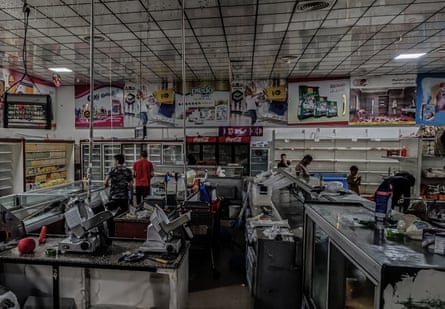Sunday 5 November
5am Jackie, the bleeding and unconscious cat I found yesterday, made it through the night. We did not sleep. We put it in the box we got for Manara. It was breathing heavily; we kept it warm, and my sister gave it water. I never thought it would make it.
I put Jackie in the cat bag and leave at 9:15 to reach the vet clinic at 10. When I arrive, there are several people before me with their pets. The most common complaint is: “My cat hasn’t eaten anything for almost a week, and it is getting aggressive, which has never happened before.”
The doctor explains that evacuation means they are out of their comfort place. Also, at the evacuation places, whether it is a house or a school, there are at least 30 to 40 people, and everyone wants to “play with the cat”, so it stresses them out.
The doctor checks Jackie and says the situation is critical. Till now, it hasn’t opened its eyes and is in a state similar to a coma. The doctor gives it three shots and says we should give it water and a children’s liquid food supplement, using a syringe every two to three hours.
“Will it make it?” I ask.
“It all depends on its response in the coming days,” the vet says. “By the way, you have to bring it in for at least two days for the rest of the injections.”
At least we have some hope. And it turns out that Jackie is a he, so from now on we shall call him Jack.
11:30am On my way back, I meet a guy I know, and I am shocked by his look.
“My hair, right?” he says, noticing my confused look.
“I am sorry, but … ”
“I know – it turned grey! Within three weeks, just like that.”
I saw him a month ago, and he had few grey hairs only. But now, most of his hair is grey! I talk to a friend later, and she says the same thing happened to her brother. Do stress, fear and sadness turn your hair grey in a month? If I had access to good internet, I would have Googled it.
One thing I am sure of is that this time has successfully added wrinkles to our faces – in my case, lines under my eyes and circles of darkness. For the first time, the veins of my feet are popping out like an old man’s. This experience has taken many years of our lives, past years and years to come. The question is: how many more years will we lose?

12:30pm I am surprised to see a jewellery shop open. Who would buy jewellery these days? Is it safe to open this shop with the thousands of people passing by? I hear two guys talking about it, and they point out something: the owner is not showing any pieces of jewellery. He is not selling gold, he is buying gold.
People don’t have money, and the only way to survive for some of them is to sell their jewellery. What better time to buy those pieces for cheap prices? I feel horrible about the whole situation, yet a part of me feels good that some people have an option to get money, even if this means losing some of their jewellery.
I receive a phone call from my friend to check on me. He shares the story of his neighbour who decided to stay with his elderly father in their apartment in Gaza City while his family went south. “They barely have contact with him. His father’s health is deteriorating. The horror they are facing is unbelievable. They don’t have enough food or water. His family here is dying every second away from him.”
5pm My friend starts discussing with me the situation after the nightmare is over. She is worried about all the people who would go back to their areas but would be homeless; or for those who will have to spend thousands of dollars to fix their houses to meet the bare minimum standards of living. She speaks about the emotional distress every Gazan will have to deal with.
But she is thinking about the aftermath, which means that she thinks it will be over, and even over soon. It’s not that I lack this optimism, but from what I see, hear and learn, it is going to take a much longer time.
9pm We lose connection again. Whatever. What else do we have to lose? We have lost our dignities, our lives, our memories … the connection is no big deal any more.
I recall a poem I read once by Sabrina Benaim in her book Depression & Other Magic Tricks. She says:
I held hands with my sadness / Sang it songs in the shower, fed it lunch / And put it to bed early
Is that what my friend and other people are thinking? Putting their sadness to bed early so they can steal some time to spend with hope? If I put sadness to bed early, what about fear? What about grief? What about sorrow? What about exhaustion?
For me, I am still in phase one, or maybe in phase zero with my sadness. I am still trying to be face to face with it and tell “him” that I see him. Just like that. It is going to be a very long journey just to realise the amount of sadness I have within.
If we get out of this, I want to be sad for a long time, to hold my sadness in my hands, hug it tight, and then maybe try to move on with my life, or what is left of it.

